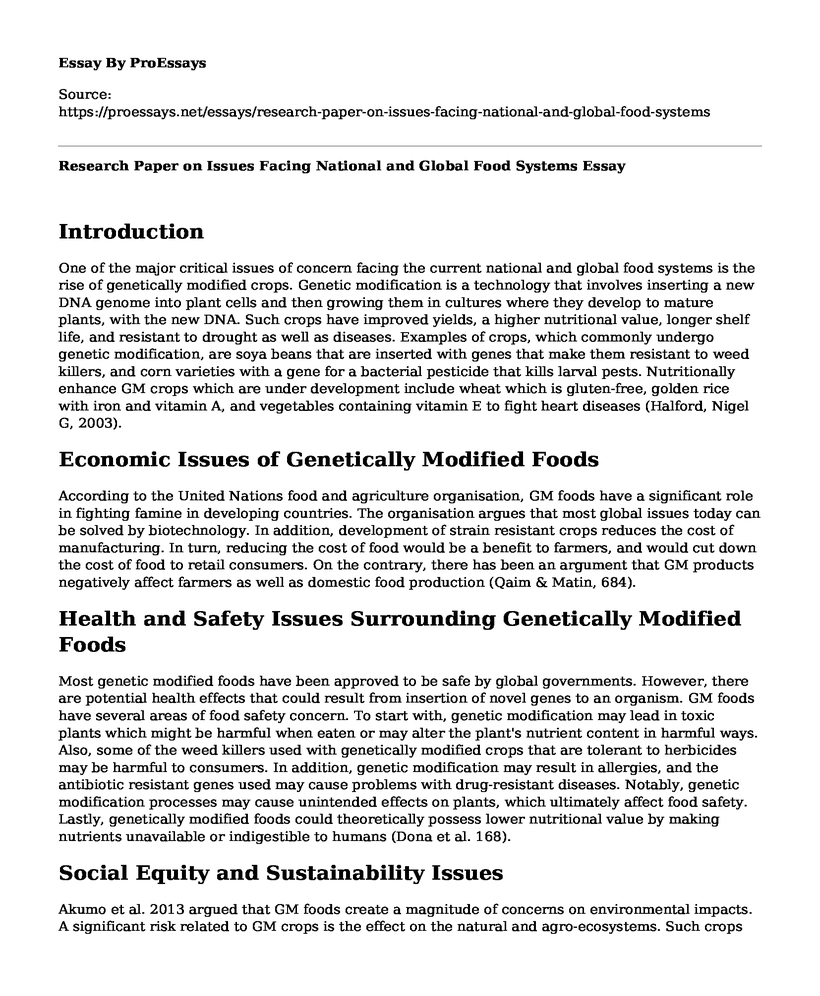Introduction
One of the major critical issues of concern facing the current national and global food systems is the rise of genetically modified crops. Genetic modification is a technology that involves inserting a new DNA genome into plant cells and then growing them in cultures where they develop to mature plants, with the new DNA. Such crops have improved yields, a higher nutritional value, longer shelf life, and resistant to drought as well as diseases. Examples of crops, which commonly undergo genetic modification, are soya beans that are inserted with genes that make them resistant to weed killers, and corn varieties with a gene for a bacterial pesticide that kills larval pests. Nutritionally enhance GM crops which are under development include wheat which is gluten-free, golden rice with iron and vitamin A, and vegetables containing vitamin E to fight heart diseases (Halford, Nigel G, 2003).
Economic Issues of Genetically Modified Foods
According to the United Nations food and agriculture organisation, GM foods have a significant role in fighting famine in developing countries. The organisation argues that most global issues today can be solved by biotechnology. In addition, development of strain resistant crops reduces the cost of manufacturing. In turn, reducing the cost of food would be a benefit to farmers, and would cut down the cost of food to retail consumers. On the contrary, there has been an argument that GM products negatively affect farmers as well as domestic food production (Qaim & Matin, 684).
Health and Safety Issues Surrounding Genetically Modified Foods
Most genetic modified foods have been approved to be safe by global governments. However, there are potential health effects that could result from insertion of novel genes to an organism. GM foods have several areas of food safety concern. To start with, genetic modification may lead in toxic plants which might be harmful when eaten or may alter the plant's nutrient content in harmful ways. Also, some of the weed killers used with genetically modified crops that are tolerant to herbicides may be harmful to consumers. In addition, genetic modification may result in allergies, and the antibiotic resistant genes used may cause problems with drug-resistant diseases. Notably, genetic modification processes may cause unintended effects on plants, which ultimately affect food safety. Lastly, genetically modified foods could theoretically possess lower nutritional value by making nutrients unavailable or indigestible to humans (Dona et al. 168).
Social Equity and Sustainability Issues
Akumo et al. 2013 argued that GM foods create a magnitude of concerns on environmental impacts. A significant risk related to GM crops is the effect on the natural and agro-ecosystems. Such crops might destroy beneficial soil microorganisms that this plays a vital role in the degradation of crop residues and biogeochemical cycles. Their argument was supported by Maghari who argued that genetic modification provides options on how forestry and agricultural lands can be used.
The most urgent aspect of genetic modification of crops is economic sustainability. It is vital to produce sufficient food for the total population without degrading the ability to create such amount in future. The aspect of genetically modified foods that is most challenging to address is the public concerns, especially where analyst must provide valid data and answer questions on whether foods have been genetically modified or not, to enable consumers to make informed choices. Among the roadblocks encountered when addressing public concerns include determining the effects of genetically modified foods on the environment, concerns about mixing GM and non-GM foods in the food supply.
Work Cited
Akumo, Divine Nkonyam, Heidi Riedel, and Iryna Semtanska. "Social and Economic Issues-Genetically Modified Food." Food Industry. InTech, 2013.
Maghari, Behrokh Mohajer, and Ali M. Ardekani. "Genetically modified foods and social concerns." Avicenna journal of medical biotechnology 3.3 (2011): 109.
Rosendal, G. Kristin, and Anne Ingeborg Myhr. "GMO assessment in Norway: Societal utility and sustainable development," EMBO reports 10.9 (2009): 939-940.
Qaim, Matin. "The economics of genetically modified crops." Annu. Rev. Resour. Econ. 1.1 (2009): 665-694.
Dona, Artemis, and Ioannis S. Arvanitoyannis. "Health risks of genetically modified foods." Critical reviews in food science and nutrition 49.2 (2009): 164-175.
Halford, Nigel G. Genetically modified crops. 2003.
Wolfenbarger, Laressa L., and Paul R. Phifer. "The ecological risks and benefits of genetically engineered plants." Science290.5499 (2000): 2088-2093.
Cite this page
Research Paper on Issues Facing National and Global Food Systems. (2022, Jun 19). Retrieved from https://proessays.net/essays/research-paper-on-issues-facing-national-and-global-food-systems
If you are the original author of this essay and no longer wish to have it published on the ProEssays website, please click below to request its removal:
- Pharmaceutical Patents Essay
- South Africa Mental Health Challenges Paper Example
- U.S Pharmaceutical Industry - Assignment Example
- Mental Health Challenges in the COVID-19 Pandemic: 45% of US Adults Affected - Essay Sample
- TB in Elderly Man: Boris Vasilescu's Case Study - Essay Sample
- Paper Example on COVID-19: Impact on Global Immigration and Economy
- Labor Unions: Enhancing Employer-Employee Relationships - Report Sample







